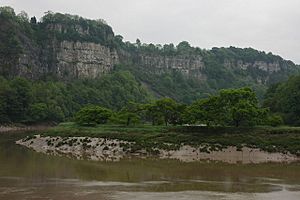John Winter (Royalist) facts for kids
Sir John Winter (born around 1600, died 1676) was an important English businessman and landowner. He owned a lot of land in Lydney, Gloucestershire. He was also a very strong supporter of King Charles I during the English Civil War.
Contents
Sir John Winter's Early Life and Business
John Winter was one of the grandsons of Sir William Wynter. William Wynter was a high-ranking naval officer who was given the Lydney estate in the Forest of Dean. John's parents were Sir Edward Wynter and Anne, who was the daughter of the Earl of Worcester.
Iron Making in the Forest of Dean
The Forest of Dean had many rich deposits of iron ore. People had been making iron there since Roman times, using charcoal from the forest's trees. John's father, Edward Winter, had invested in making iron. Sir John continued and grew this family business.
Protests and Land Rights
Many local people were unhappy with Sir John Winter. They felt he was interfering with their traditional rights in the Forest of Dean. These rights allowed them to use the forest for things like grazing animals or collecting wood.
In 1624, some people claimed that Winter and others were storing gunpowder at Raglan Castle. This was his uncle's fortress. They said he was planning a rebellion against King James.
In 1628, Sir John got a special agreement from the King. It allowed him to cut a huge amount of wood from the forest for 21 years. But he had to give this up in 1634. A special court found that he had taken more than he was allowed. This court was the first of its kind in the Forest of Dean for 300 years. It happened after protests in 1631, where local people protested against his fences. These protests were part of a bigger movement called the Western Rising.
On February 20, 1640, Sir John paid a large sum of money for all the mines, minerals, and stone quarries in the Forest of Dean. He also gained rights to all the timber and trees there. He soon had 15 furnaces and 20 forges. This made him the second largest iron maker in England. However, many local people were still unhappy with this deal. During the English Revolution, they destroyed the fences Winter had put up.
The King's Supporter in War
When the First Civil War began, Sir John Winter used his ironworks to make cannons for the King. He was a devoted Catholic and a private secretary to the Queen. So, it was expected that he would support King Charles. He declared his support during the siege of Gloucester.
In 1642, Winter tried to send weapons from his home in Lydney to Gloucester. The next year, he made his house stronger to protect it from attacks. After Parliament's forces helped Gloucester, he fought many times against Colonel Massey. Massey was the governor of Gloucester. Sir John was not a popular leader and often lost battles. But he always managed to escape.

Escapes and Legends
In October 1644, Sir John joined Prince Rupert to try and take back a crossing point on the River Severn at Beachley. Parliament's forces had taken it. The attempt failed. Winter escaped by climbing down a cliff at Sedbury into a boat that was waiting for him.
Again, in early 1645, Massey's troops trapped Winter near the River Wye at Lancaut. He had been trying to secure a river crossing. But he managed to escape by boat once more. Stories of his amazing escapes grew over time. A local legend says he leaped on his horse down the 200-foot cliffs above Lancaut. These cliffs were later named "Wintour's Leap".
His house in Lydney, called White Cross Manor, had been fortified. In April 1645, he ordered it to be burned down. He did this to stop the Parliamentarians from taking it over.
After the War: New Ideas
After the King was restored to power, Sir John Winter continued his interest in the iron industry. He experimented with a new type of oven for making coke. Coke is a special fuel used in iron making. His experiments were an early step towards the successful work later done by Abraham Darby. Darby found a way to smelt iron using coke.
 | Sharif Bey |
 | Hale Woodruff |
 | Richmond Barthé |
 | Purvis Young |

